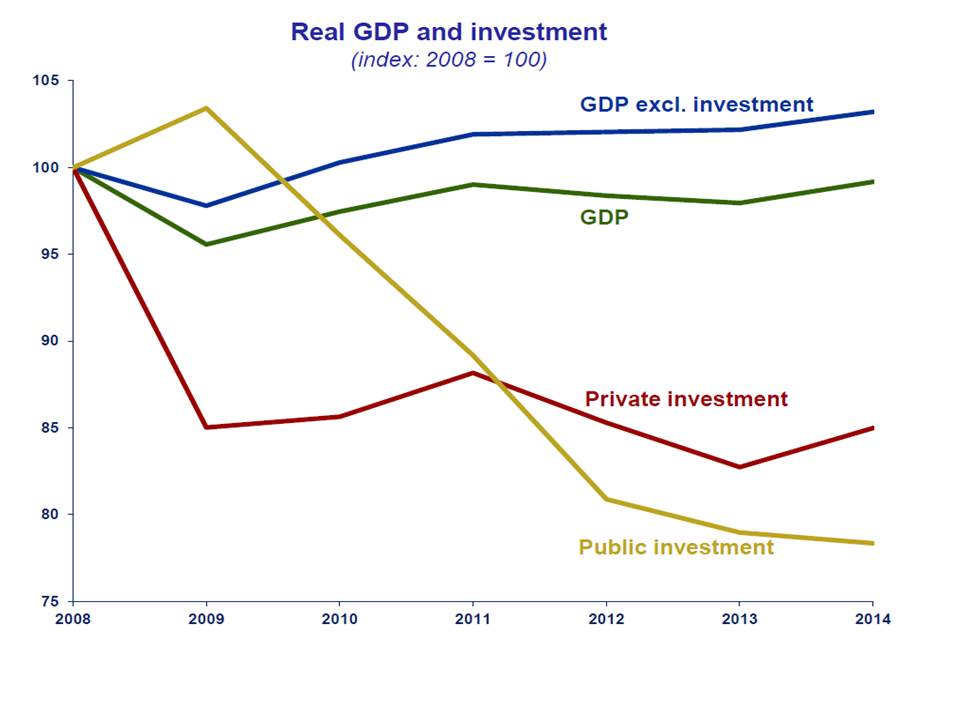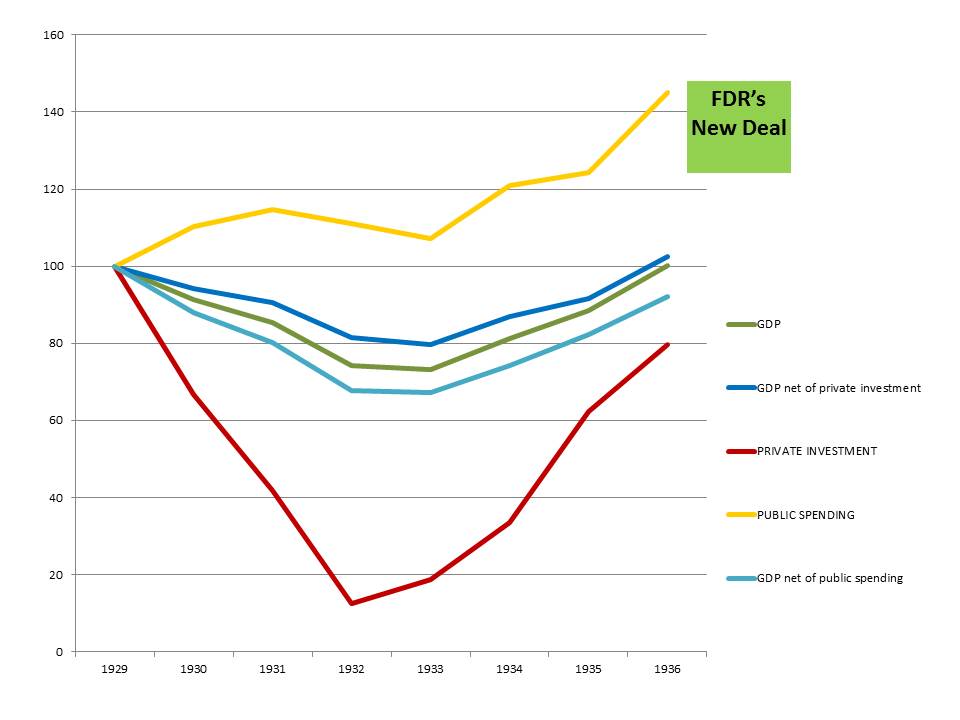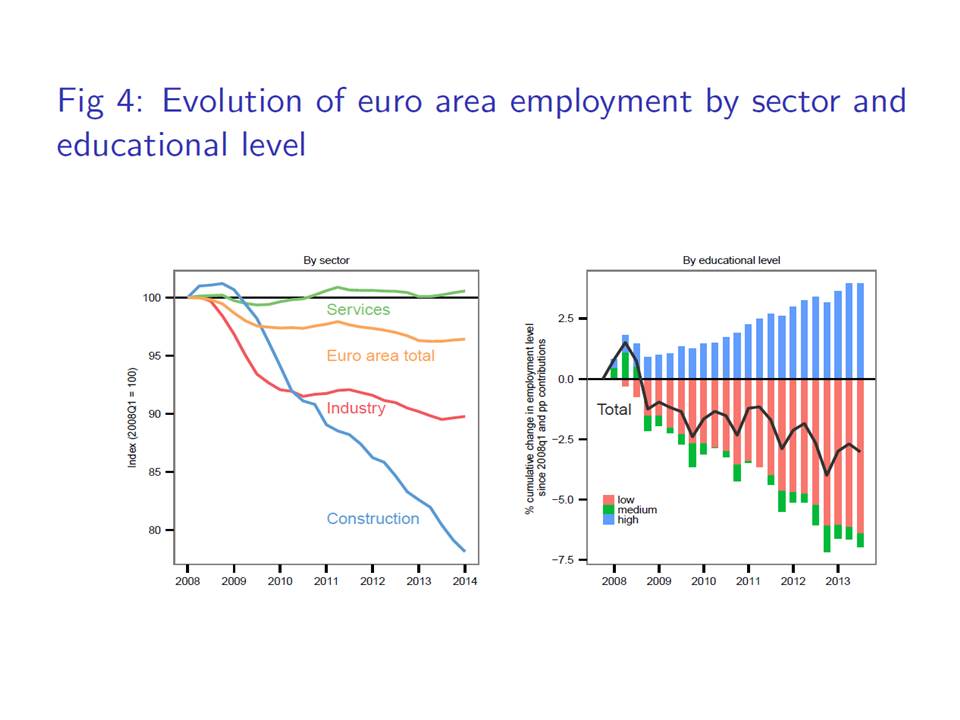For my English readers asking me for updates on the dramatic European stagnation, I wish to convey to them the news that Mario Draghi, the President of the European Central Bank, has just posted this horrible graph that tells the story of a continent bit by a storm of mosquitos carrying the Malaria virus and as a consequence in a state of irreversible coma.
http://www.ecb.europa.eu/press/key/date/2014/html/sp141024_1.en.pdf?3ce4091c3fa5a2cf312d4895e1f52dd8
 GDP in the large euro area has yet to recover to its pre-2008 crisis levels and 2015 does not look ready to provide any momentum of the good sort. Actually things are finally worsening in Germany too (“finally” as in “as expected”).
GDP in the large euro area has yet to recover to its pre-2008 crisis levels and 2015 does not look ready to provide any momentum of the good sort. Actually things are finally worsening in Germany too (“finally” as in “as expected”).
Public investment is down. Private investment is down, like consumption, for lack of hope and optimism.
For those of you, especially the American types, who wish to argue that this looks very much like the Great Depression of the Thirties, take a look at the graph I created based on data by the Bureau of Economic Analysis at the US Department of Commerce.
http://www.bea.gov/scb/pdf/2011/08%20August/0811_gdp_nipas.pdf
 See the difference? Yes, GDP suffered in the Thirties more than in the euro area today, but it also recovered faster and more certainly. Yes, private investment collapsed much more than in Europe today, but it rebounded much faster.
See the difference? Yes, GDP suffered in the Thirties more than in the euro area today, but it also recovered faster and more certainly. Yes, private investment collapsed much more than in Europe today, but it rebounded much faster.
And, most of all, NO, public spending, contrary to what has been done so far in Europe (Draghi shows only public investment but current public spending in the euro area is also collapsing) did never decrease during the Thirties. Actually, you know what? It definitely, strongly, credibly increased to sustain the recovery, lifting spirits, restoring hope. Why is Europe not doing the same, you might frankly ask.
The technical answer is that the European Union decided in 2011 to get stuck with an unbelievably idiotish fiscal policy tool called the Fiscal Compact, never used before by any country in the world, that basically says, “no matter what the state of the economy is, public spending will never be allowed to rise to sustain recovery”. Operators know this and refrain from investing and consuming.
The political answer for this masochism is harder to find. One may say that the only solution available, practiced by FDR in the Thirties, is impossible since it requires too much change on the part of European policy-makers. As restated by Nobel Prize Prof. Sims who recently underlined that Europe needed a “fiscal policy that is expansionary now, without a commitment to cut future expenditures, or raise future taxes to preserve current price stability. Unfortunately people are very convinced that it is not the fiscal policy we have and that it would require a major shift in the thinking of policy makers and the speeches they make to get people believe that this is what is actually going to happen. It requires the political system to take commitments across time and stick to them, which is very hard for politicians.”
Maybe. I do believe however that there is more than a simple problem of incapacity. The current recession is not only hitting the economy, it is dividing society. In those who keep a job and those who dont. The former, as this graph by again Mario Draghi shows, are persons with a higher degree of education. The latter are those with low education (see the RHS of the figure below).
 It is clear that the mass of poorer people that are indignant and protest against current policies are joining the ranks of the only parties that are right now representing them, populist parties like Mme Le Pen’s in France, the Northern League or the Grillo movement in Italy. This explains at the same time the current political equilibrium where governing coalitions in European hard-hit countries accept the recession without changing policies as they represent an electorate that does not feel too much the pain, and its instability, since as the recession drags on the number of displaced workers and their anger increase.
It is clear that the mass of poorer people that are indignant and protest against current policies are joining the ranks of the only parties that are right now representing them, populist parties like Mme Le Pen’s in France, the Northern League or the Grillo movement in Italy. This explains at the same time the current political equilibrium where governing coalitions in European hard-hit countries accept the recession without changing policies as they represent an electorate that does not feel too much the pain, and its instability, since as the recession drags on the number of displaced workers and their anger increase.
Just as malaria is defeated by public investments directed at removing the swamps, this European malaria could be defeated by accepting that public demand enters the economy, forces firms to produce and hire and employment to be restored, until the private sector is once again on its feet and willing to risk on its own.
But the time remaining available is short, very short. Political equilibria, especially in Europe and across its states, have always been fragile. The medicine we are choosing to cure the patient is exactly the one that will kill it, sending us back in time to a period in which the defense of national interests, in principle a sound endeavour, led us to chaos and war.
28/10/2014 @ 09:21
I contend that what we are seeing is cognitive dissonance from those who supported the “usual” parties and policies.
Electorates do feel the pain but as it did not work out like they planned (voted for years) and they are having trouble with that.
An early version of cognitive dissonance theory appeared in Leon Festinger’s 1956 book, “When Prophecy Fails” which documents the increased proselytization they exhibited after the leader’s “end of the world” prophecy failed to come true.
The same happened in the United States in the case of Bush era. Cognitive dissonance was a major reason why the American public was so slow to turn against the Bush’s administration.
Along the same lines Berlusconi’s or now Renzi’s supporters, for whatever reason, are extremely misinformed about what their Prime Minister stands for and are ignorant about the world around them. As a matter of fact the most notable characteristic of the those administration’s science policy has been the repeated distortion and suppression of scientific evidence in order to fit ideological preferences about how the world should be, rather than how it is.
Under these circumstances and being electorates affected by cognitive dissonance, no wonder if “the medicine we are choosing to cure the patient is exactly the one that will kill it”. It’s the wrong cognitive therapy.